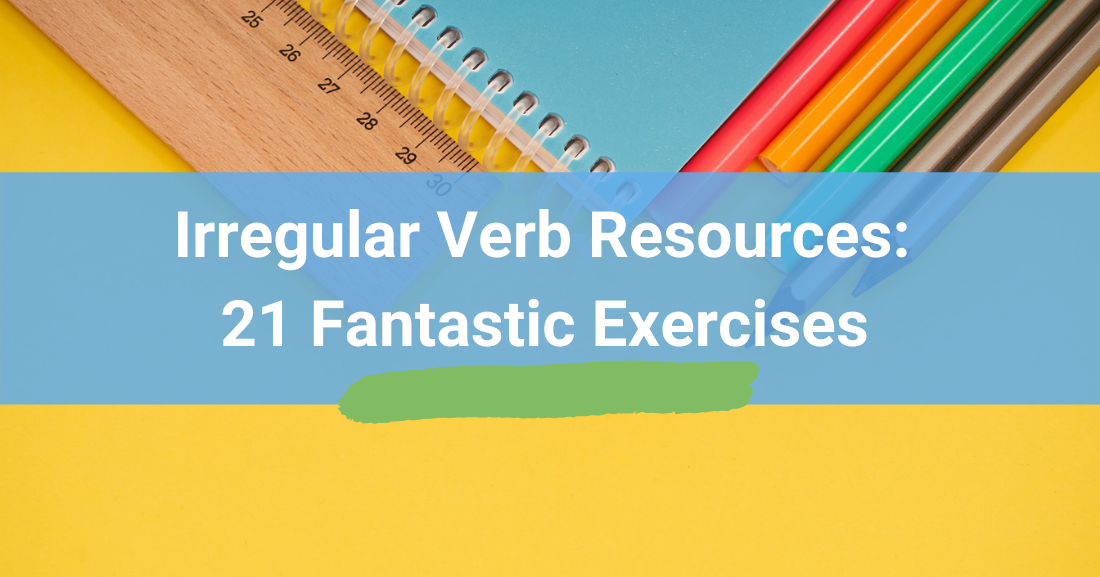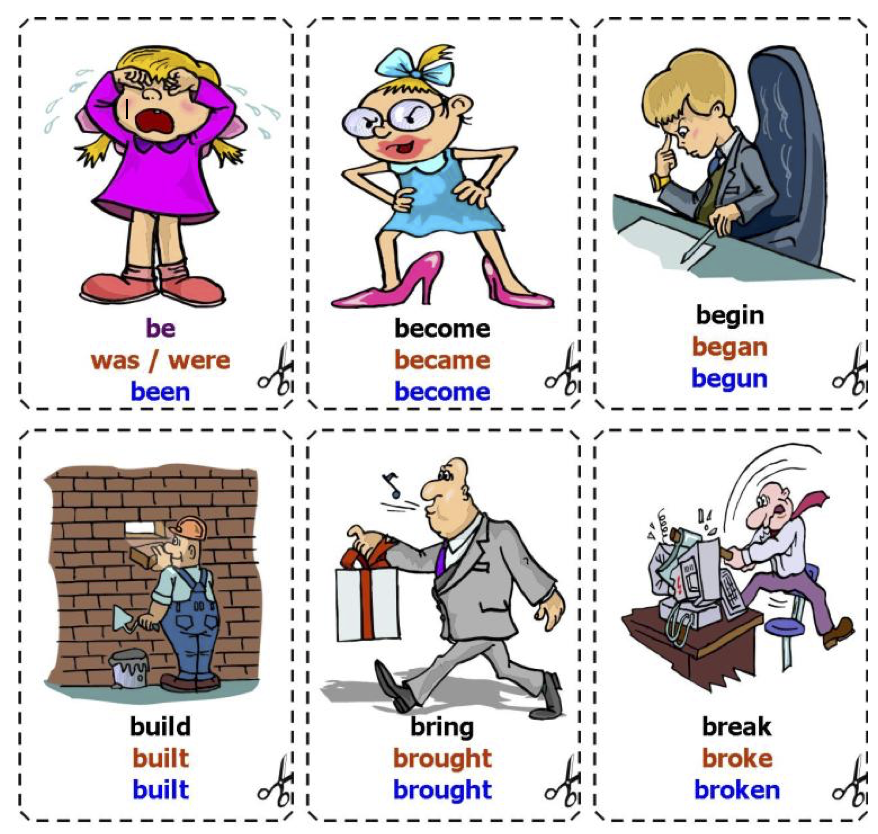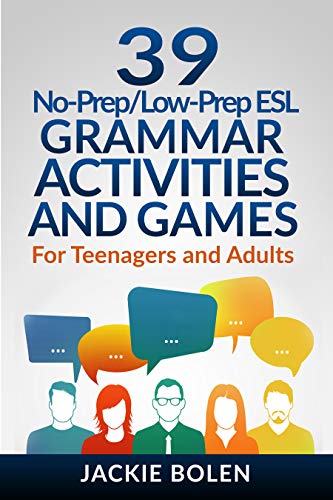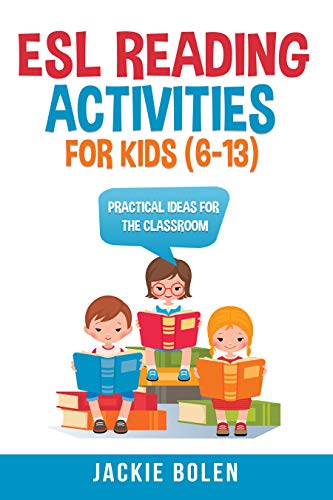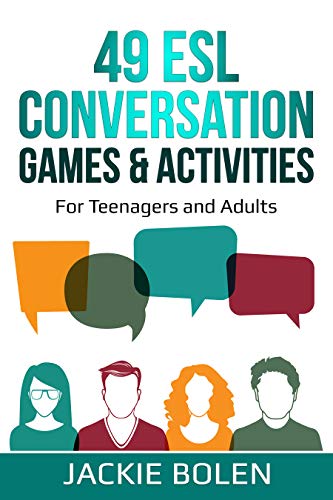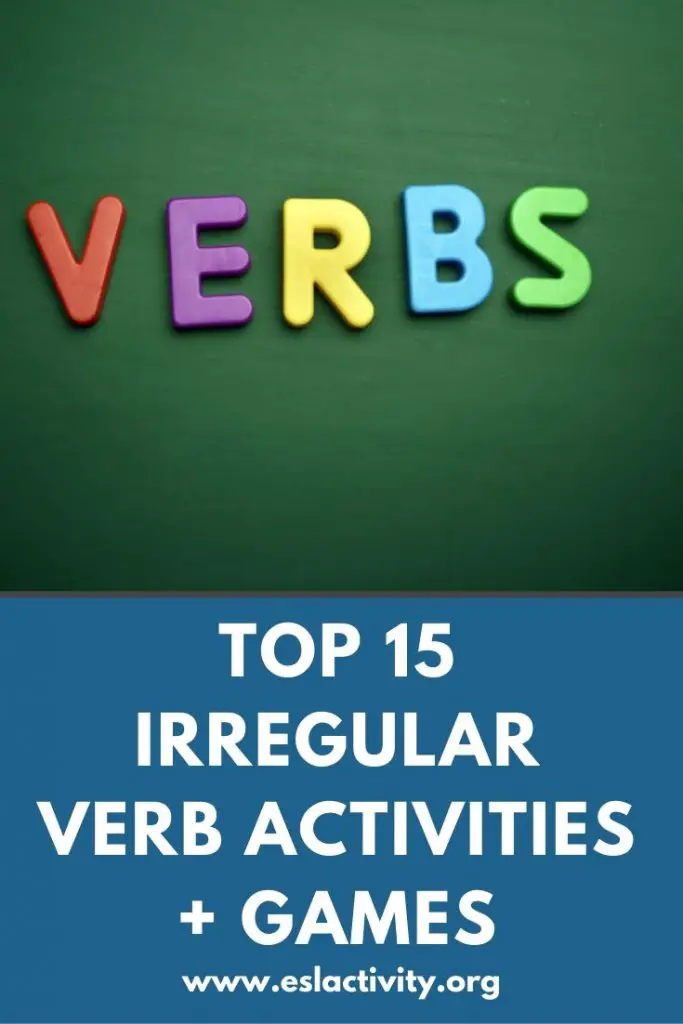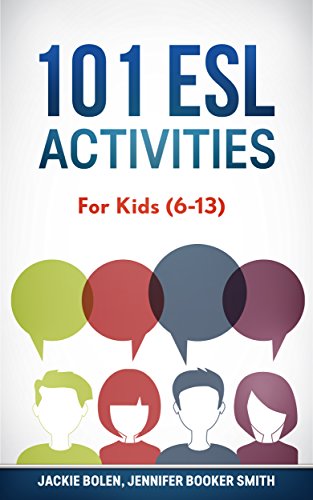If you have your lesson plan , but you’re struggling with the materials to bring it to life, you’re in the right place. Below we’ve hand-picked 21 of our favorite irregular verb resources that are fun and engaging for your class.
Looking for something more traditional? We love this irregular verb worksheet , or you can check out the whole worksheet collection here.
- Irregular Verb Bingo
- Boardgame
- Irregular Verb Crossword
- Pronouncing Irregular Verbs
- Study Resources
- Irregular Verb Tense
- Testing Out What They Learned
- More Resources For You
- Irregular Verb Activities: Top 20 | Lesson Plans & Worksheets
- Irregular Verb Activities and Games
- #1: ESL Irregular Verb Surveys
- #2: Concentration Memory Game
- #3: Proofreading and Editing
- #4: Hot Potato Game
- #5: Videos with Irregular English Verbs
- #6: Flashcard Sentences for Irregular English Verbs in the Past Tense
- #7: Dictogloss
- #8: Irregular Verbs Song
- #9: English Sentence Structure Activities
- #10: Board Games for ESL Irregular Verbs
- #11: Is that Sentence Correct?
- #12: Dialogue Substitution with Irregular Verbs
- #13: Whiteboard Games
- #14: Irregular Verb Memory Circle
- #15: Error Correction Relay Race
- #16: ESL Spelling Game
- #17: Irregular Verb Activity
- #18: Teach Irregular Verbs with Eliciting
- #19: Dictation Irregular Past Tense Verb Activity
- #20: Reading Lesson Plan with ESL Irregular Verbs
- Irregular Verbs Worksheets
- Irregular Verbs Lesson Plans
- Did you like these Irregular Verbs Games and Activities?
- Have your Say about these Irregular Verb Games
- About Jackie
- Основные неправильные глаголы английского языка с транскрипцией и переводом
- Определение неправильных глаголов
- Неправильные глаголы английского языка с транскрипцией
- Неправильные глаголы по группам для легкого запоминания
- I. Глаголы, у которых все три формы одинаковые
- II. Глаголы, у которых вторая и третья формы одинаковые
- III. Глаголы, у которых все три формы различные
- IV. Глаголы, у которых первая и третья формы одинаковые
- Как быстро выучить неправильные глаголы по английскому
- Примеры неправильных глаголов
- Тренажер неправильных глаголов английского языка
- Пройдите онлайн тест на пройденную тему и закрепите свои знания.
Видео:Выучи 124 неправильных глагола ЗА 10 МИНУТ! + ШПАРГАЛКАСкачать

Irregular Verb Bingo
Playing games in class is a great way to keep your students engaged. This downloadable irregular verb activity is fully customizable and includes questions that correspond with the Bingo squares, adding a layer of trivia — or an additional study opportunity — to the game! It also comes with printable cards, which are also fully customizable.
If that’s not quite your thing, we have another modified irregular verb Bingo game on the site as well that uses a soft ball — like a stress ball.
You say an infinitive and then throw the ball randomly — but gently! — to a student. The student then has to say the past simple form of the verb before throwing the ball back to you.
Set time limits if there’s a lot of hesitating to keep the momentum going and see how quickly you can pass the ball around the class.
Видео:КАК БЫСТРО ВЫУЧИТЬ НЕПРАВИЛЬНЫЕ ГЛАГОЛЫ АНГЛИЙСКОГО ЯЗЫКАСкачать

Boardgame
Not that Bingo isn’t a board game, but this downloadable board game is great because students can play in groups or pairs. You’ll need dice, counters, and — of course — the board.
When students land on a square, they need to make a sentence using the verb of the square they landed on.
You can modify the rules in any way you see fit.
For example, do your students need to use that exact word they land on or modify it to past simple and make a sentence with that word?
Видео:8. Неправильные глаголы английского языка #английскийязык, #неправильныеглаголы, #SmartAlex100Скачать

Irregular Verb Crossword
This crossword uses irregular verbs , but you can change the rules if this won’t challenge your students enough. You can give them sentence clues, ask them to convert the given words to past simple, or anything else you can think of!
This isn’t quite what it sounds like, and I’ll admit, it’s certainly not what I expected when I opened it. This is a worksheet for a poem — but it’s a poem that your students need to pick the right words for.
If time has ( come came ) when it aches
To ( learn learnt ) irregular verbs by heart
Just ( have had ) the time it takes
Students need to take the correct verb and write it next to the line in the provided space to make the poem make sense.
Видео:Учим неправильные глаголы | Speak all Week | Разговорный английскийСкачать

Pronouncing Irregular Verbs
Pronunciation of new vocab is often tough — and confusing — for students. This irregular verb printout offers some help with pronouncing irregular verbs in the infinitive, past simple, past participle for irregular verbs.
It’s short, easy to read, and easy to scan — but looks a bit intimidating.
We have another resource that’s a bit less…. scary-looking. This printout for pronunciation offers pictures, definitions, and various tenses, as well as pronunciation.
We have one last pronunciation printout for irregular verbs — this one, however, was made specifically for French students who are studying English.
Видео:#shorts Неправильные глаголы английского языка | Irregular verbs.Скачать

Study Resources
We love the printouts above, but we have a vast resource full of additional study materials. We have two sets of flashcards (with pictures) for irregular verbs if your students are getting the hang of how to spell, read, and pronounce them.
Each set has 27 flashcards. You can get the first set of flashcards here , and the second set of flashcards here .
But we also have sets of bookmarks that contain irregular verbs that include the infinitive, past simple, and past participle of each verb.
Видео:105 неправильных глаголов. Английский язык для начинающих. Лучший словарь английского языка.Скачать

Irregular Verb Tense
Teaching irregular verb tense — and how to get students to identify each type and when to use them — can be tricky.
We suggest starting with teaching present perfect and past simple first since those are usually the easiest to grapple with. If your students have already mastered those two, you can check out our article on teaching tense to your students or jump over to our hand-picked best verb tense worksheets .
Видео:105 НЕПРАВИЛЬНЫХ ГЛАГОЛОВ за 7 минут. НЕПРАВИЛЬНЫЕ ГЛАГОЛЫ АНГЛИЙСКОГО ЯЗЫКА. АНГЛИЙСКИЙ ЯЗЫКСкачать

Testing Out What They Learned
Of course, we have tons of tests, quizzes, and other ways to see what stuck with your students — but these are some of our favorites:
This short quiz is a customizable fill in the blanks-style quiz. Students are given a short story with blanks they need to fill in with the correct verb tense. They’re provided the verb — but in a form that they’ll need to convert to its past tense in order to get it right.
This longer test on irregular verbs involves students filling in the blanks as well. This time, they’ll need to fill in two blanks for the infinitive, past simple, and past participle — depending on the tense that’s missing.
For example, “Be” is provided for the infinitive, but your students will need to convert it to past simple and past participle in order to answer the question correctly.
And, finally, this last test on irregular verbs can be used as a test or a worksheet. Students are given the infinitive tense for all the verbs, but they need to put in the past simple and past participle tenses as well as provide the definition for the word.
Видео:#shorts Неправильные глаголы английского языка | Irregular verbsСкачать

More Resources For You
If you’re still struggling to get your students to engage, we have a blog post about out-of-the-box activities for teaching irregular verbs to help you out. In fact, that blog post was so popular that we wrote a follow-up with even more out-of-the-box ideas!
Видео:ТОП 65 неправильных глаголов с примерами | English SpotСкачать

Irregular Verb Activities: Top 20 | Lesson Plans & Worksheets
Are you looking for some interesting, engaging irregular verb activities and games for your ESL/EFL classes? Then you’re most certainly in the right place. Keep on reading for all the irregular verb games you need, along with worksheets, lesson plans and lots of other good stuff!
Irregular verbs games and activities
Видео:Видео тренажёр для эффективного запоминания неправильных глаголов в английском языке.Скачать

Irregular Verb Activities and Games
Here’s what you’ve been waiting for! Keep on reading for the top 20 irregular verb activities to try out in your English classes today.
#1: ESL Irregular Verb Surveys
One of my favourite activities that I like to do with my students are surveys. They’re interactive, cover a range of skills and best of all, get the students up and out of their seats talking to their classmates. Perfect for those sleepy Monday mornings, right?
If you want to work on irregular past tense verbs, you could combine it with the present perfect if you require a follow-up question. For example:
Find someone who…
- …has been to another country?
- Where did you go?
- I went to Thailand.
See how that works? Just be sure to choose appropriate questions in order to facilitate irregular verb use. Do you want to try it out with your students? More details here about how to set it up:
#2: Concentration Memory Game
If you’re teaching beginners about irregular verbs for the first time, consider using this game at the end of class as a way to review key concepts. The way it works is that you can make sets of cards. One card will have the regular verb in the present tense while the other will have the irregular past tense verb. For example:
- eat/ate
- sleep/slept
- go/went
Then, prepare one set of cards for each group of 4 students. Then place them face down on the desk and try to find the matching set. From there, it basically becomes a memory game. Find out all the details you need to know right here;
- Amazon Kindle Edition
- Bolen, Jackie (Author)
- English (Publication Language)
- 87 Pages — 10/24/2019 (Publication Date)
#3: Proofreading and Editing
I like to use proofreading and editing as a quick warmer activity. If you’re focusing on ESL irregular verbs, a lot of the mistakes can be related to this. Students have to go through the passage and find all the errors. Here’s some more information about how to use this activity in your classes:
#4: Hot Potato Game
The hot potato game is a fun activity that most students really love. The way it works is that students pass around an object and then when the music or timer stops, the person holding the object has to do something.
In this case, you may want to say a verb and then students have to make a sentence using the irregular verb in the past. For example.
- Eat
- I ate pizza for dinner last night.
#5: Videos with Irregular English Verbs
There are a million and one ESL videos on YouTube and English Central. It’s a good time to be an English teacher, right? You can certainly find a ton of videos that feature irregular verbs. However, to get the best use of them, you’ll want to do some pre and post-watching activities.
- Amazon Kindle Edition
- Bolen, Jackie (Author)
- English (Publication Language)
- 75 Pages — 05/31/2020 (Publication Date)
#6: Flashcard Sentences for Irregular English Verbs in the Past Tense
In my opinion, flashcards are one of those things that belong in the hand of every single ESL teacher for beginners for every single class! There are just so many activities that you can do with them.
In this case, you may want to put some flashcards on the table. Students have to pick 1-2 of them and then make a sentence in the past. If you choose the pictures carefully, they could lend themselves really well to irregular verbs. For example:
- I ate dinner with my Mom last night.
- I went to school
#7: Dictogloss
Try out this challenging listening activity that lends itself well to irregular English verbs. The way it works is that you find (or write) a passage with lots of irregular verbs in the past. It could be about a past vacation for example. Then, read it out at a slightly faster pace than the students are used to.
In pairs, students have to work to re-create the story either through speaking or writing. You can read the original more quickly and students can update theirs as needed. Finally, students can compare their version with the original. Hopefully they will have used the correct irregular verbs!
#8: Irregular Verbs Song
Songs, chants and raps are a fun way to learn English! Here’s one of top picks on YouTube:
#9: English Sentence Structure Activities
If you want to help your students work on irregular English verbs in the context of sentences, then you’ll want to check out these games and activities. They’re ideal for getting students to start using verbs in sentences and are also an excellent review for more advanced level students.
Do you want to see some ideas for this? Check this article out: ESL Sentence Structure Activities.
#10: Board Games for ESL Irregular Verbs
In real life, I’m ALL about playing board games which is why I like to use them with my students too. They’re fun, interactive and the best part is that you can use them for a variety of topics, grammatical points or vocabulary sets. If you design the questions well, it could be some teaching irregular verbs gold.
Do you want to find out more about how to make your own? Check this out:
#11: Is that Sentence Correct?
A quick warm-up activity for beginners is this activity. Write down a few sentences on the whiteboard or on the PowerPoint. Some have mistakes while others are fine. In this case, you’d want to focus on verbs, particularly the irregular ones.
Students have to decide if the sentence is correct or not and if it’s not, they have to change it. Do you want to learn more about this warmer or review activity? Check it out here:
- Amazon Kindle Edition
- Bolen, Jackie (Author)
- English (Publication Language)
- 94 Pages — 06/18/2020 (Publication Date)
#12: Dialogue Substitution with Irregular Verbs
Maybe your students are kinda like mine? When they have a dialogue in the textbook (a common way to introduce irregular verbs), they mindlessly read it with their partner but have no idea what they read. It’s not their fault. It’s just that they didn’t have a reason to read! We can do better than this!
Something I like to do is take out all the verbs and students have to use the context of the sentence to figure out what goes in there. This takes it from an easy reading activity to one that challenges meaning as well. Try it out and I’m sure you’ll have some great results with it too.
#13: Whiteboard Games
Students love to write on the whiteboard! I think a lot of it has to do with the novelty factor. Whatever the reason, whiteboard games lend themselves really well to irregular verbs because you can do a lot of different races and relays. Here are some of the best ideas:
#14: Irregular Verb Memory Circle
A fun game to play with your students is this memory circle game. The way it works is that the first students says a statement using a target verb. Then, the next students repeats it and adds their own. For example:
- I ate pizza for dinner last night.
- Tommy ate pizza for dinner and I went TV shopping last night.
The game continues on until one person is left standing. If you can’t remember a statement, you need to sit down. You can check out all the details right here: ESL Circle Game.
#15: Error Correction Relay Race
I love this relay race because it takes someone old (error correction) and makes it new again. It’s a fun change of pace for your students and a nice break from the same old routine.
In this case, you’d want to ensure that many of the mistakes are related to verbs, particularly the irregular ones. Find out how to play this game here: Error Correction Relay Race ESL.
ESL irregular verbs
#16: ESL Spelling Game
The spelling of irregular verbs in English can be a bit tricky for beginners. That’s why I like to focus on them in class with this fun spelling game. To mix things up a bit, consider saying either the irregular past tense verb or the present tense and students have to use their listening skills to decide which one it is.
#17: Irregular Verb Activity
#18: Teach Irregular Verbs with Eliciting
Unless your students are beginners, it’s likely they’ve already seen a number of irregular past tense verbs. If this is the case, using some eliciting techniques is an ideal way to start the class off with. There are two main reasons to consider doing so.
The first is that it’s easy to find out what the students already know about this grammatical point so you can tailor your lesson to what they don’t know. The second reason is that eliciting helps students activate any prior knowledge they may have about ESL irregular verbs. This makes new things easier to learn and remember.
There are a number of ways to do this. Here are some of the best ideas:
#19: Dictation Irregular Past Tense Verb Activity
I know that dictation has kind of fallen out of favour these days with the more communicative approach to language teaching. However, it can be quite a useful exercise and certainly one to consider using for teaching irregular past tense verbs.
For beginners, say the irregular verb and students can write it in their notebooks. For higher level students, you could say the base form of the verb and have students write down the past tense form. Or, you could say a sentence containing the target word.
Finally, you may want to dictate either a question or an answer. Then, have students write that down and either answer the question, or form a question for the statement.
#20: Reading Lesson Plan with ESL Irregular Verbs
I like to mix things up a bit and do some dedicated reading lessons with my students. It’s an important skill that’s not often focused on in TEFL classes. It’s also possible to have a secondary focus to them besides reading, like reviewing irregular past tense verbs.
To learn how to design your own reading lesson based on whatever the target grammar or vocabulary is, have a look here:
Видео:IRREGULAR VERBS 🔥 Учим НЕПРАВИЛЬНЫЕ ГЛАГОЛЫ В АНГЛИЙСКОМСкачать

Irregular Verbs Worksheets
Do you want some irregular verb worksheets that you can print and go? I’m sure you do! It’s an easy way to get your students practicing this important skill without a ton of work on your part. Here are some of our favourite resources:
Видео:Как запомнить неправильные глаголы английского языка. Просто и понятно!Скачать

Irregular Verbs Lesson Plans
If you want some ESL lesson plans that focus on irregular English verbs, then you’ll want to check out our top recommendations right here:
Видео:Неправильные Глаголы Английского Языка.Тренажер Irregular Verbs #НеправильныеГлаголыАнглийскогоЯзыкаСкачать

Did you like these Irregular Verbs Games and Activities?
- Amazon Kindle Edition
- Smith, Jennifer Booker (Author)
- English (Publication Language)
- 133 Pages — 03/31/2016 (Publication Date)
Yes? Thought so. Then you’re going to love this book over on Amazon: 101 ESL Activities for Kids. The key to better English classes with children is a wide variety of engaging, interesting and student-centred activities. This book will help you do that in style.
The best part is that the book is organized into various sections so you should be able to find an activity or game that’ll work with your students in just a minute or two. If that’s not some ESL teaching gold, then I’m not really sure what it is!
The book is available in both digital and print formats. Take the electronic version with you on your phone tablet for some serious lesson planning at your favourite coffee shop. Or, keep the physical book on the bookshelf in your office to use as a handy reference guide. It really is that easy to have better English classes.
Does it sound like exactly what you need? Head on over to Amazon to learn more about the book right here:
Видео:5. Неправильные глаголы английского языка | 6 группа #SmartAlex100English, #английскийязыкСкачать

Have your Say about these Irregular Verb Games
What do you think about these irregular past tense verbs games and activities? Did you try out one of them from this list or do you have another recommendation? Leave a comment below and let us know. We’d love to hear from you.
Also be sure to give this article a share on Facebook, Pinterest, or Twitter. It’ll help other busy teachers, like yourself find this useful resource.
Last update on 2021-09-19 / Affiliate links / Images from Amazon Product Advertising API
About Jackie
Jackie Bolen has been teaching English for more than 15 years to students in South Korea and Canada. She’s taught all ages, levels and kinds of TEFL classes. She holds an MA degree, along with the Celta and Delta English teaching certifications.
Jackie is the author of more than 60 books for English teachers and English learners, including Business English Vocabulary Builder and 39 No-Prep/Low-Prep ESL Speaking Activities for Teenagers and Adults. She loves to share her ESL games, activities, teaching tips, and more with other teachers throughout the world.
Видео:#shorts Самые популярные неправильные глаголы английского языка | Irregular verbsСкачать

Основные неправильные глаголы английского языка с транскрипцией и переводом
В данной статье мы собрали самые основные неправильные глаголы английского языка, которые часто встречаются в повседневной жизни и которые необходимы на пути к совершенствованию языка. А также распредели неправильные глаголы по группам, чтобы жизнь была сказкой для тех, кто искал именно это.
p, blockquote 1,0,0,0,0 —>
Ниже вы найдете список неправильных глаголов с произношением и переводом.
p, blockquote 2,0,0,0,0 —>
p, blockquote 3,0,0,0,0 —>
Видео:1. Неправильные глаголы. Тренажер 1 #SmartAlex100English, #английскийязык, #английскийснуляСкачать

Определение неправильных глаголов
Неправильные глаголы являются популярными глаголами в английском языке, которые не следуют простому методу добавления “d” или “ed” в конце слова, чтобы сформировать прошедшее время. Это означает, что написание может быть немного запутанным.
p, blockquote 4,0,0,0,0 —>
Многие Irregular verbs одинаковы, как и в простом прошедшем времени, так и в Причастии II. Такие как: cut – cut, had – had и так далее. К сожалению, изучение неправильных глаголов означает, что нужно их учить и учить. Но не расстраивайтесь, хорошо? У вас все получиться.
p, blockquote 5,0,0,0,0 —>
Глагольные формы следующие:
- the base form — to fall
- the third-person, singular, present tense: he falls
- the third-person past tense: he fell
- and the past participle: he has fallen
p, blockquote 7,0,1,0,0 —>
Видео:Неправильные глаголы в английском языке | Speak all WeekСкачать

Неправильные глаголы английского языка с транскрипцией
Кто-то хочет путешествовать, а кто-то узнать, сколько всего неправильных глаголов в английском языке. Вы действительно хотите это знать? И вы действительно готовы выучить все глаголы? Тогда мы ответим на ваш вопрос. Внимание ответ: около 400.
p, blockquote 8,0,0,0,0 —>
Здесь находиться ваша обещанная таблица. В каждый столбец мы поместили по глаголу, который начинается с инфинитива и заканчивается переводом. После таблицы будет красоваться оранжевая кнопка, на которую можно нажать и основные неправильные глаголы станут вашими. Поэтому оберегайте их. Они любят, чтобы их учили каждый день и использовали в разговорной речи. А если вы не будите о них заботиться, то они обидятся на вас, и вы их забудете! И не сможете общаться с иностранцами.
p, blockquote 9,0,0,0,0 —>
| Infinitive | Past Indefinite | Past Participle | Перевод |
| B | |||
| Be [biː] | Was / Were [wɒz][wɜː] | Been [biːn] | Быть |
| Bear [bɛə] | Bore [bɔ:] | Born(e) [bɔ:n] | Рожать |
| Beat [biːt] | Beat [biːt] | Beaten [ˈbiːt(ə)n] | Бить |
| Become [bɪˈkʌm] | Became [bɪkeɪm] | Become [bɪˈkʌm] | Становиться |
| Begin [bɪˈgɪn] | Began [bɪgæn] | Begun [bɪgʌn] | Начинать |
| Blow [bləʊ] | Blew [blu:] | Blown [bləʊn] | Дуть, взорваться |
| Break [breɪk] | Broke [brəʊk] | Broken [ˈbrəʊk(ə)n] | Ломать |
| Bring [brɪŋ] | Brought [brɔːt] | Brought [brɔːt] | Приносить |
| Build [bɪld] | Built [bɪlt] | Built [bɪlt] | Строить |
| Burn [bɜːn] | Burnt [bɜ:nt] | Burnt [bɜ:nt] | Сжигать |
| Buy [baɪ] | Bought [bɔ:t] | Bought [bɔ:t] | Покупать |
| Burst [bɜːst] | Burst [bɜːst] | Burst [bɜːst] | Лопаться |
| C | |||
| Can [kæn] | Could [kʊd] | Been able to [biːnˈeɪbəl] | Мочь |
| Catch [kæʧ] | Caught [kɔːt] | Caught [kɔːt] | Поймать |
| Choose [ʧuːz] | Chose [tʃəʊz] | Chosen [ˈtʃəʊzn] | Выбирать |
| Come [kʌm] | Came [keɪm] | Come [kʌm] | Приходить |
| Cost [kɒst] | Cost [kɒst] | Cost [kɒst] | Стоить |
| Cut [kʌt] | Cut [kʌt] | Cut [kʌt] | Резать |
| Creep [kriːp] | Crept [krept] | Crept [krept] | Ползать |
| D | |||
| Deal [diːl] | Dealt [delt] | Dealt [delt] | Иметь дело |
| Do [duː] | Did [dɪd] | Done [dʌn] | Делать |
| Drink [drɪŋk] | Drank [dræŋk] | Drunk [drʌŋk] | Пить |
| Drive [draɪv] | Drove [drəʊv] | Driven [drɪvən] | Водить машину |
| Draw [drɔː] | Drew [dru:] | Drawn [drɔ:n] | Рисовать |
| Dig [dɪg] | Dug [dʌg] | Dug [dʌg] | Копать |
| Dive [daɪv] | Dived; dove [daɪvd] | Dived [daɪvd] | Нырять |
| E | |||
| Eat [iːt] | Ate AmE [eɪt] BrE [et] | Eaten [i:tn] | Есть |
| F | |||
| Fall [fɔ:l] | Fell [fel] | Fallen [fɔ:lən] | Упасть |
| Feed [fi:d] | Fed [fed] | Fed [fed] | Кормить |
| Feel [fi:l] | Felt [felt] | Felt [felt] | Чувствовать |
| Fight [faɪt] | Fought [fɔ:t] | Fought [fɔ:t] | Бороться |
| Find [faɪnd] | Found [faʊnd] | Found [faʊnd] | Находить |
| Fly [flaɪ] | Flew [flu:] | Flown [fləʊn] | Летать |
| Forget [fərget] | Forgot [fərgɒt] | Forgotten [fərgɒtn] | Забывать |
| Forgive [fəgɪv] | Forgave [fəgeɪv] | Forgiven [fəgɪvn] | Прощать |
| G | |||
| Get [get] | Got [gɒt] | Got [gɒt] | Получать |
| Give [gɪv] | Gave [geɪv] | Given [gɪvən] | Дать |
| Go [gou] | Went [went] | Gone [gɔn] | Идти |
| H | |||
| Have [hæv] | Had [hæd] | Had [hæd] | Иметь |
| Hear [hɪər] | Heard [hɜ:rd] | Heard [hɜ:rd] | Слышать |
| Hold [həʊld] | Held [held] | Held [held] | Держать |
| K | |||
| Keep [ki:p] | Kept [kept] | Kept [kept] | Хранить |
| Know [nəʊ] | Knew [njuː] | Known [nəʊn] | Знать |
| L | |||
| Leave [li:v] | Left [left] | Left [left] | Уходить |
| Lend [lend] | Lent [lent] | Lent [lent] | Давать взаймы |
| Let [let] | Let [let] | Let [let] | Позволять |
| Light [laɪt] | Lit, lighted [lɪt] | Lit, lighted [lɪt] | Освещать |
| Lose [lu:z] | Lost [lɒst] | Lost [lɒst] | Потерять |
| M | |||
| Make [meɪk] | Made [meɪd] | Made [meɪd] | Делать |
| Mean [mi:n] | Meant [ment] | Meant [ment] | Означать |
| Meet [mi:t] | Met [met] | Met [met] | Встречать |
| P | |||
| Pay [peɪ] | Paid [peɪd] | Paid [peɪd] | Платить |
| Put [ˈpʊt] | Put [ˈpʊt] | Put [ˈpʊt] | Ставить, класть |
| R | |||
| Read [ri:d] | Read [red] | Read [red] | Читать |
| Ring [rɪŋ] | Rang [ræŋ] | Rung [rʌŋ] | Звонить |
| Run [rʌn] | Ran [ræn] | Run [rʌn] | Бегать |
| S | |||
| Say [seɪ] | Said [sed] | Said [sed] | Сказать |
| See [si:] | Saw [sɔ:] | Seen [si:n] | Видеть |
| Sell [sel] | Sold [soʊld] | Sold [soʊld] | Продавать |
| Send [send] | Sent [sent] | Sent [sent] | Посылать |
| Set [set] | Set [set] | Set [set] | Устанавливать |
| Shine [ʃaɪn] | Shone [ʃɔn] | Shone [ʃɔn] | Светить |
| Show [ʃəʊ] | Showed [ʃəʊd] | Shown [ʃəʊn] | Показывать |
| Shut [ʃʌt] | Shut [ʃʌt] | Shut [ʃʌt] | Закрывать |
| Sing [sɪŋ] | Sang [sæŋ] | Sung [sʌŋ] | Петь |
| Sit [sɪt] | Sat [sæt] | Sat [sæt] | Сидеть |
| Sleep [sli:p] | Slept [slept] | Slept [slept] | Спать |
| Speak [spi:k] | Spoke [spəʊk] | Spoken [ˈspəʊk(ə)n] | Говорить |
| Spend [spend] | Spent [spent] | Spent [spent] | Тратить |
| Stand [stænd] | Stood [stʊd] | Stood [stʊd] | Стоять |
| Sweep [swiːp] | Swept [swept] | Swept [swept] | Подметать |
| Swim [swɪm] | Swam [swæm] | Swum [swʌm] | Плавать |
| T | |||
| Take [teɪk] | Took [tʊk] | Taken [teɪkən] | Брать |
| Teach [ti:tʃ] | Taught [tɔ:t] | Taught [tɔ:t] | Учить |
| Tell [tel] | Told [təʊld] | Told [təʊld] | Рассказывать |
| Think [θɪŋk] | Thought [θɔːt] | Thought [θɔːt] | Думать |
| Throw [θrəʊ] | Threw [θruː] | Thrown [θroʊn] | Бросить |
| U | |||
| Understand [ʌndərstænd] | Understood [ʌndərstʊd] | Understood [ʌndərstʊd] | Понимать |
| Upset [ʌpset] | Upset [ʌpset] | Upset [ʌpset] | Расстраивать |
| W | |||
| Wake [weɪk] | Woke [woʊk] | Woken [ˈwoʊkən] | Просыпаться, будить |
| Wear [weər] | Wore [wɔːr] | Worn [wɔːn] | Носить |
| Win [wɪn] | Won [wʌn] | Won [wʌn] | Побеждать |
| Write [raɪt] | Wrote [rəʊt] | Written [rɪtn] | Писать |
Сразу все заучивать не нужно. Самое главное употреблять глаголы в речи, а не отдельно без текста. Полная таблица неправильных глаголов представлена в статье, которую можно скачать в формате pdf.
p, blockquote 10,0,0,0,0 —>
p, blockquote 11,0,0,0,0 —>
Это видео вам точно понравится! Можно с легкостью запомнить самые употребляемые неправильные глаголы в английском языке, всего лишь послушав рэпачок! Повторяйте за автором.
p, blockquote 12,0,0,0,0 —>
p, blockquote 13,0,0,0,0 —>
Видео:Как выучить НЕПРАВИЛЬНЫЕ ГЛАГОЛЫСкачать

Неправильные глаголы по группам для легкого запоминания
Неправильные формы глаголов можно изучить отдельно по группам. Возможно для кого-то такой метод легче других методов. Кстати о них можно прочитать в следующей статье 100 неправильных глаголов английского языка.
p, blockquote 14,1,0,0,0 —>
Улучшить правильное произношение неправильных глаголов вам поможет аудио запись. Прослушивайте ее каждый день и повторяйте вслух. Слова автоматически будут всплывать у вас из головы.
p, blockquote 15,0,0,0,0 —>
p, blockquote 16,0,0,0,0 —>
Неправильные глаголы английского языка по группам с транскрипцией и переводом обязательно вам пригодятся. Если вдруг вам кажется, что здесь не достает какого-либо слова, вы можете пополнять коллекцию, вписывая слова в таблицу. Ваша таблица неправильных глаголов по группам постепенно будет увеличиваться и тем самым так быстрее будут запоминаться эти бесстыжие глаголы, которые иногда не могут запомниться с первого раза.
p, blockquote 17,0,0,0,0 —>
I. Глаголы, у которых все три формы одинаковые
h3 1,0,0,0,0 —>
| Infinitive | Past Indefinite | Past Participle | Translation |
| cut [kʌt] | cut [kʌt] | cut [kʌt] | резать |
| shut [ʃʌt] | shut [ʃʌt] | shut [ʃʌt] | закрывать |
| put [pʊt] | put [pʊt] | put [pʊt] | класть |
| hurt [hɜːt] | hurt [hɜːt] | hurt [hɜːt] | причинять боль |
| burst [bɜːst] | burst [bɜːst] | burst [bɜːst] | взорваться |
| let [let] | let [let] | let [let] | позволять |
| set [set] | set [set] | set [set] | устанавливать |
| hit [hɪt] | hit [hɪt] | hit [hɪt] | ударить |
| cost [kɒst] | cost [kɒst] | cost [kɒst] | стоить |
| spread [spred] | spread [spred] | spread [spred] | распространять |
| bet [bet] | bet [bet] | bet [bet] | держать пари |
| quit [kwɪt] | quit [kwɪt] | quit [kwɪt] | бросать, уходить |
II. Глаголы, у которых вторая и третья формы одинаковые
h3 2,0,0,0,0 —>
| Infinitive | Past Indefinite | Past Participle | Translation |
| send [send] | sent [sent] | sent [sent] | посылать |
| spend [spend] | spent [spent] | spent [spent] | тратить,проводить (время) |
| lend [lend] | lent [lent] | lent [lent] | давать взаймы |
| bend [bend] | bent [bent] | bent [bent] | гнуть |
| build [bɪld] | built [bɪlt] | built [bɪlt] | строить |
| burn [bɜːn] | burnt [bз:nt] | burnt [bз:nt] | жечь |
| learn [lɜ:n] | learnt [lɜ:nt] | learnt [lɜ:nt] | учиться |
| spill [spɪl] | spilt [spɪlt] | spilt [spɪlt] | проливать |
| spoil [spɔɪl] | spoilt [spɔɪlt] | spoilt [spɔɪlt] | портить |
| smell [smel] | smelt [smelt] | smelt [smelt] | пахнуть |
| make [meɪk] | made [meɪd] | made [meɪd] | делать |
| have [hæv] | had [hæd] | had [hæd] | иметь |
| sell [sel] | sold [soʊld] | sold [soʊld] | продавать |
| tell [tel] | told [təʊld] | told [təʊld] | сообщать |
| say [seɪ] | said [sed] | said [sed] | говорить |
| lose [lu:z] | lost [lɒst] | lost [lɒst] | терять |
| leave [li:v] | left [left] | left [left] | покидать |
| mean [mi:n] | meant [ment] | meant [ment] | значить |
| dream [dri:m] | dreamt [dremt] | dreamt [dremt] | мечтать |
| sleep [sli:p] | slept [slept] | slept [slept] | спать |
| keep [ki:p] | kept [kept] | kept [kept] | хранить |
| feel [fi:l] | felt [felt] | felt [felt] | чувствовать (себя) |
| feed [fi:d] | fed [fed] | fed [fed] | кормить |
| fight [faɪt] | fought [fɔ:t] | fought [fɔ:t] | бороться |
| lead [li:d] | led [led] | led [led] | вести |
| read [ri:d] | read [red] | read [red] | читать |
| hold [həʊld] | held [held] | held [held] | держать |
| stand [stænd] | stood [stʊd] | stood [stʊd] | стоять |
| slide [slaɪd] | slid [slɪd] | slid [slɪd] | скользить |
| find [faɪnd] | found [faʊnd] | found [faʊnd] | находить |
| meet [mi:t] | met [met] | met [met] | встречать(ся) |
| sit [sɪt] | sat [sæt] | sat [sæt] | сидеть |
| shoot [ʃuːt] | shot [ʃɒt] | shot [ʃɒt] | стрелять |
| get [get] | got [gɒt] | got [gɒt] | получать, становиться |
| light [laɪt] | lit [lɪt] | lit [lɪt] | зажигать |
| bring [brɪŋ] | brought [brɔːt] | brought [brɔːt] | приносить |
| catch [kæʧ] | caught [kɔːt] | caught [kɔːt] | ловить |
| teach [ti:tʃ] | taught [tɔ:t] | taught [tɔ:t] | учить, обучать |
| sweep [swiːp] | swept [swept] | swept [swept] | мести |
| think [θɪŋk] | thought [θɔːt] | thought [θɔːt] | думать |
| win [wɪn] | won [wʌn] | won [wʌn] | побеждать |
| shine [ʃaɪn] | shone [ʃɔn] | shone [ʃɔn] | светить |
III. Глаголы, у которых все три формы различные
h3 3,0,0,0,0 —>
| Infinitive | Past Indefinite | Past Participle | Translation |
| do [duː] | did [dɪd] | done [dʌn] | делать |
| go [gou] | went [went] | gone [gɔn] | идти, ехать |
| be [biː] | was, were [wɒz][wɜː] | been [biːn] | быть |
| wear [weər] | wore [wɔːr] | worn [wɔːn] | носить |
| tear [ˈtɪə] | tore [tɔ:] | torn [tɔ:n] | разрывать |
| lie [laɪ] | lay [leɪ] | lain [leɪn] | лежать |
| see [si:] | saw [sɔ:] | seen [si:n] | видеть |
| break [breɪk] | broke [brəʊk] | broken [ˈbrəʊk(ə)n] | ломать |
| draw [drɔː] | drew [dru:] | drawn [drɔ:n] | рисовать |
| speak [spi:k] | spoke [spəʊk] | spoken [ˈspəʊk(ə)n] | говорить |
| grow [groʊ] | grew [gru:] | grown [groʊn] | расти |
| steal [sti:l] | stole [stoʊl] | stolen [stoʊlən] | красть |
| throw [θrəʊ] | threw [θruː] | thrown [θroʊn] | бросать |
| freeze [fri:z] | froze [froʊz] | frozen [froʊzn] | замерзать |
| know [nəʊ] | knew [njuː] | known [nəʊn] | знать |
| choose [ʧuːz] | chose [tʃəʊz] | chosen [ˈtʃəʊzn] | выбирать |
| show [ʃəʊ] | showed [ʃəʊd] | shown [ʃəʊn] | показывать |
| forget [fərget] | forgot [fərgɒt] | forgotten [fərgɒtn] | забывать |
| blow [bləʊ] | blew [blu:] | blown [bləʊn] | дуть |
| hide [haɪd] | hid [hɪd] | hidden [hɪdn] | прятать |
| fly [flaɪ] | flew [flu:] | flown [fləʊn] | летать |
| eat [iːt] | ate AmE [eɪt] BrE [et] | eaten [i:tn] | кушать |
| drink [drɪŋk] | drank [dræŋk] | drunk [drʌŋk] | пить |
| fall [fɔ:l] | fell [fel] | fallen [fɔ:lən] | падать |
| sink [sɪŋk] | sank [sæŋk] | sunk [sʌŋk] | тонуть |
| shake [ʃeɪk] | shook [ʃʊk] | shaken [ʃeɪkən] | трясти |
| sing [sɪŋ] | sang [sæŋ] | sung [sʌŋ] | петь |
| take [teɪk] | took [tʊk] | taken [teɪkən] | брать, взять |
| begin [bɪˈgɪn] | began [bɪgæn] | begun [bɪgʌn] | начинать |
| give [gɪv] | gave [geɪv] | given [gɪvən] | давать |
| rise [raɪz] | rose [roʊz] | risen [rɪzn] | подниматься |
| ride [raɪd] | rode [roʊd] | ridden [rɪdn] | ездить |
| beat [biːt] | beat [biːt] | beaten [ˈbiːt(ə)n] | бить |
| swim [swɪm] | swam [swæm] | swum [swʌm] | плавать |
| write [raɪt] | wrote [rəʊt] | written [rɪtn] | писать |
IV. Глаголы, у которых первая и третья формы одинаковые
h3 4,0,0,0,0 —>
| Infinitive | Past Indefinite | Past Participle | Translation |
| run [rʌn] | ran [ræn] | run [rʌn] | бегать |
| come [kʌm] | came [keɪm] | come [kʌm] | приходить |
Видео:НЕПРАВИЛЬНЫЕ ГЛАГОЛЫ АНГЛИЙСКОГО ЯЗЫКА ПРАКТИКА АНГЛИЙСКИЙ ЯЗЫК УРОК 1 АНГЛИЙСКИЙ ДЛЯ НАЧИНАЮЩИХСкачать

Как быстро выучить неправильные глаголы по английскому
Этот вопрос мучает многих людей, которые изучают английский. Самый простой совет – это практиковаться, используя все основные неправильные глаголы английского. Настоящий друг, которого вы все знаете – это ВРЕМЯ. Спустя некоторое время, все irregular verbs будут в вашей голове. Нужно терпение и самое главное общение. Чем больше вы общаетесь на изучаемом языке, тем быстрее идет процесс обучения. Выучили правило, используйте его в речи, выучили новую фразу, используйте ее в речи.
p, blockquote 18,0,0,0,0 —>
Что делать, если не с кем общаться? Во-первых, не стесняйтесь зайти на специальные сайте, где изучают только языки. Там вы найдете людей, которые ищут собеседника точно также как и Вы. Во-вторых, общайтесь с друзьями на английском, которые тоже хотят выучить The English Language. Способов много, а вопрос один: Есть ли желание?
p, blockquote 19,0,0,0,0 —>
В статье топ 50 неправильных глаголов в английском языке, вы найдете для себя ответ на вопрос, который не дает вам покоя «как выучить неправильные глаголы английского языка».
p, blockquote 20,0,0,0,0 —>
Видео:Неправильные глаголы английского языка #SmartAlex100English, #АнглийскийДляНачинающих, #английскийСкачать

Примеры неправильных глаголов
Прочитайте примеры с irregular verbs, переведите их на русский и конечно придумайте свои предложения.
p, blockquote 21,0,0,1,0 —>
1. My friend from China drew a picture for me.
2. The maid made the beds in the rooms.
3. You haven’t shut the door.
4. I have spoken with the boss.
5. They boys fought after school.
6. Last night Robert ate a slice of pizza.
7. Bill sold lemonade.
8. We haven’t seen parents today.
9. She has forgotten my phone number.
10. Ryan and James gave presents to each other.
11. My team has been beaten three times already.
12. We did these exercises last week.
13. I saw the girl last month.
14. They got to the stadium by trolley-bus.
15. I became a Master of Sport last year.
16. He couldn’t play tennis.
17. Who of your athletes have taken first place this week?
18. I have won three medals in the international tournament.
19. He liked skiing when he was a school boy.
20. They have done all the exercises which you gave them.
p, blockquote 22,0,0,0,0 —>
Запомните, что неправильные глаголы непредсказуемые. Если вы сомневаетесь в написании или произношении глагола лучше всего заглянуть в таблицу.
p, blockquote 23,0,0,0,0 —>
Тренажер неправильных глаголов английского языка
Мы подготовили Worksheet irregular verbs. А на русском просто письменные упражнения. Скачивайте их, пожалуйста, Судари и Сударыни и делайте упражнения. Маленький совет для вас, наши хорошие, ни в коем случаи не подсматривайте в таблицу, если забыли слово. Подумайте немного, а если уж совсем не вспоминается тогда уж ладно, подсматривайте.
p, blockquote 24,0,0,0,0 —>
p, blockquote 25,0,0,0,0 —>
Вот и сказочки конец, а кто прочел до конца МОЛОДЕЦ!
Ты давай-ка не ленись и немного пошевелись. Курсор мышки наведи и поставь нам ПЯТЬ ЗВЕЗДЫ.
p, blockquote 26,0,0,0,0 —>
Пройдите онлайн тест на пройденную тему и закрепите свои знания.
Впишите правильный ответ, а также выберите из трех вариантов верный.
p, blockquote 27,0,0,0,0 —>
p, blockquote 28,0,0,0,0 —>
p, blockquote 29,0,0,0,1 —>
Если вы нашли ошибку, пожалуйста, выделите фрагмент текста и нажмите Ctrl+Enter.

